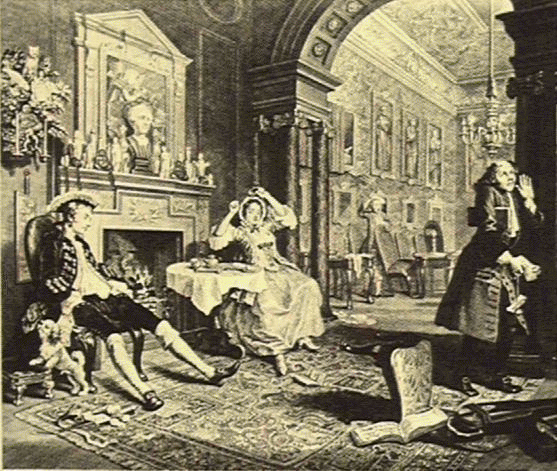
[somewhat dated--created this page many years ago!] PHILOSOPHY OF TEACHING AND SCHOLARSHIP
I teach a wide range of courses to undergraduate and graduate students, with emphasis upon situating courses in critical theory and in 18th-20th century British literature in relation to recent scholarship. For example, in courses on critical theory I introduce students to interpretive theory and practice through a selective study of poststructural critiques of texts/culture/history. In such courses and others, students learn to analyze the ways that texts and discourses shape how we read, structure our identities, produce meaning, and how they may invite us to participate in the negotiation and the reconstruction of knowledge and power across various disciplines, communities, and institutions.
Moreover, I seek appropriate ways to integrate current theory and methodologies into students' critical practice and into my pedagogy. For instance, in lower-division courses I encourage students to think critically not only about the subjects in question--drawing upon readings from across the disciplines, periods, and genres--but to reflect upon their interest and investment in particular cultural perspectives and discourses, and the means by which they habitually construct and resolve problems related to such ways of knowing. Because writing, reading, and discussion produce knowledge and are social activities, I structure part of time in class as a workshop, enabling students in small groups to respond to one another's writing and to collaborate upon specific writing and reading tasks.
In classes at all levels, I also encourage students to participate in guiding their learning through shared responsibility to facilitate discussion and writing in class, in small groups, and via online group discussions. I try to foster a collaborative, critical pedagogy in which I exchange my views and expertise as well as provide occasions for students to become teachers, creating further opportunities for us to learn together. I hope to enable students not only to review academic discourse critically, but to participate in its production and ultimately in the crucial work of reproducing culture, knowledge, and community.
My scholarly writing and research informs upper-division and graduate courses that I teach on contemporary cultural analyses of literature from various periods and genres, particularly new historicist and feminist studies of political, social, and gender relations in Britain, 1600-1800, and more recently, courses on contemporary British fiction. I choose texts to expand the traditional canon of writers to include work from different perspectives and positions previously marginalized, ignored, or unavailable. I have offered, among such courses, a class on Aphra Behn and Caryl Churchill, pairing important women playwrights in Britain from the late 17th and 20th centuries; a class on women novelists from the late 18th century to the present, and a course on early British women novelists; a class on sexual politics in Restoration and 18th-century British literature; a class in integrative critical theory with emphasis on British colonial relations; a class on contemporary American women's fiction; and special topics, such as a class on Edith Wharton and Contemporary Theory, courses focusing on Restoration and early 18th-century British literature, and courses on Restoration and Early Eighteenth-Century British Drama.
Just as my scholarly interests have shaped my teaching, students and courses have influenced my research, especially my interest in pedagogy and critical theory in practice. I have written essays on recent critical approaches to teaching Shakespeare, on feminist pedagogy and the literature of Western civilization, and on teaching post-structuralist theory to undergraduates.
I focus my limited scholarship, however, on Restoration and Eighteenth-Century British literature, analyzing in particular the cultural reception of plays popular during the reign of Charles II. The period is rich in possibilities: over five hundred plays were produced on the London stage between 1660 and 1710, and a growing number of these plays have received extended cultural analysis. Though such scholarship contributes to and connects the University of Idaho with the work of other scholars whose research and teaching focuses on various forms of representation in the Early Modern period, it also implicitly participates in a much broader debate that addresses, as expressed by Gregory S. Jay in College English, questions over "what new ways of representation might better achieve the goals of justice and democracy in the overlapping worlds of education and politics" (10).
If, for example, we consider current public concern over political representation in government and the relation of government to education, we may also discover that here at Idaho we find people preoccupied with the problems and promises of representation as both faculty and students strive to represent the diverse modes of knowledge and culture our world offers. I feel faculty should work to enable students to reproduce their culture and to reconstruct the world, work that is ongoing before they enter the university but which continues during their college careers and beyond when they take on jobs and tasks in their local communities and also their relationships to global communities and conflicts. I hope that our students will learn the crucial importance of such representation, its interdisciplinary nature and contexts, and their opportunities to participate in representing their views to others, as well as their obligations to try to understand what others represent to them. Henry Giroux addresses such concerns in a 'recent' interview entitled "Rethinking the Promise of Critical Education Under an Obama Regime."
I have enjoyed my varied and exciting work in the Department of English and in the University Honors Program. Through these positions, as advisor to first-year undergraduates in English, as an advisor for the Women's Studies Minor, and as someone who coordinated advising for national scholarship opportunities, I have had the pleasure of becoming acquainted with students, faculty, and administrators with diverse interests and expertise, and here, via the UI Homepages, I appreciate the opportunity to get to know an even wider range of students and colleagues.